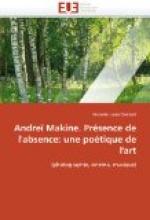|
This section contains 11,121 words (approx. 38 pages at 300 words per page) |

|
SOURCE: Safran, Gabriella. “Andreï Makine's Literary Bilingualism and the Critics.” Comparative Literature 55, no. 3 (summer 2003): 246-65.
In the following essay, Safran examines Makine's unique role as a bilingual Russian and French writer, noting the critical reception of his works by Russian, French, and American literary critics.
Andrei Makine's Le testament français (1995), an evocation of a Russian childhood and youth spent under the influence of a French grandmother and marked by the dream of a distant France, has more than a few things in common with the story of the writer himself. After Makine emigrated to France in 1987 at the age of 30, he began writing in French, but Parisian publishers were unwilling even to look at manuscripts submitted by a man with a Russian name and accented speech. His first two novels—La fille d'un héros de l'Union soviétique (A Soviet Hero's Daughter) and Confession d'un porte-drapeau...
|
This section contains 11,121 words (approx. 38 pages at 300 words per page) |

|


